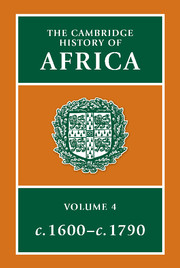Book contents
- Frontmatter
- Introduction
- 1 Egypt, the Funj and Darfur
- 2 The central Sahara and Sudan
- 3 North-West Africa: from the Maghrib to the fringes of the forest
- 4 The Guinea coast
- 5 Central Africa from Cameroun to the Zambezi
- 6 Southern Africa and Madagascar
- 7 Eastern Africa
- 8 Ethiopia and the Horn of Africa
- 9 Africa in Europe and the Americas
- Bibliographical Essays
- Bibliography
- Index
- References
4 - The Guinea coast
Published online by Cambridge University Press: 28 March 2008
- Frontmatter
- Introduction
- 1 Egypt, the Funj and Darfur
- 2 The central Sahara and Sudan
- 3 North-West Africa: from the Maghrib to the fringes of the forest
- 4 The Guinea coast
- 5 Central Africa from Cameroun to the Zambezi
- 6 Southern Africa and Madagascar
- 7 Eastern Africa
- 8 Ethiopia and the Horn of Africa
- 9 Africa in Europe and the Americas
- Bibliographical Essays
- Bibliography
- Index
- References
Summary
The Guinea coast at the start of the seventeenth century was less developed than the western Sudanic hinterland, which had larger territorial states and more differentiated societies and whose peoples displayed a greater capacity to organize production and to defend or expand their spheres of socio-political control. But also on the coast one is dealing with a historical situation which has as its antecedents millennia of slow population growth, enhancement of technology, and spread of specialization. An outstanding consequence of cumulative growth and development was the emergence of distinctive cultures over relatively large zones. Moving from west to east one could distinguish four areas: upper Guinea, with a dominating Mande presence; the Gold Coast, where the Akan were prominent; Yoruba/Aja territory; and eastern Nigeria, comprising mainly the Ibo and Ibibio. Social differentiation and the emergence of state powers were of major significance in all of these areas, and the internal contradictions were invariably affected in some degree by the presence of Europeans.
YORUBA, AJA, BINI
The culture zone which had the deepest roots by 1600 embraced all the Yoruba and included the Bini and the Aja. The family was the most important unit in daily life, and the specific patterns of family organization throughout the region had much in common. The Yoruba word ebi is equivalent to ‘family’ among most of the groups involved – from the Aja to the Itsekiri. Understandably, the ebi family principles were extended to the political superstructure. The leading states of this ‘Ebi Commonwealth’ (as it has been called) were Oyo, Benin and Dahomey.
- Type
- Chapter
- Information
- The Cambridge History of Africa , pp. 223 - 324Publisher: Cambridge University PressPrint publication year: 1975
References
- 11
- Cited by

